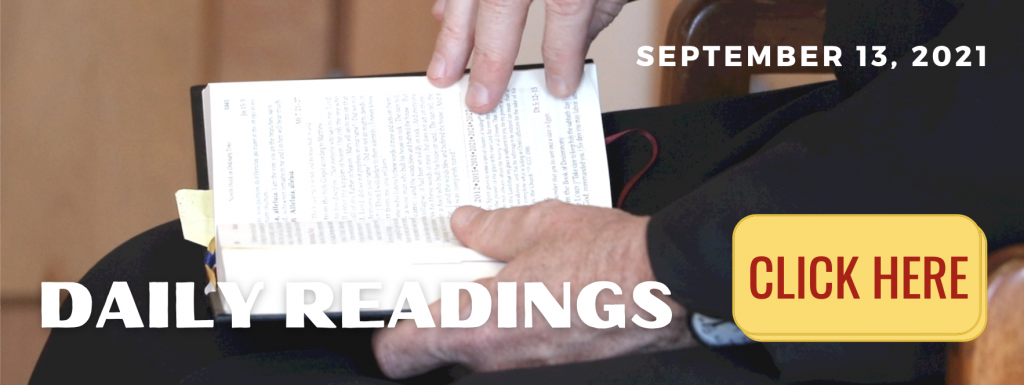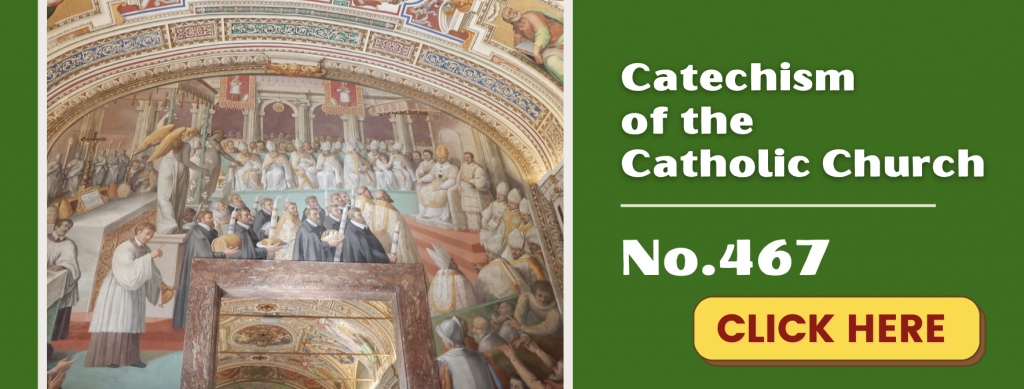Memorial of Saint John Chrysostom, Bishop and Doctor of the Church



“For greater things you were born.” (Ven. Mother Luisita)
Monday, September 13th Lk. 7: 1-10 Jesus and the Centurion….
Part One:
“The centurion sent friends to tell him, ‘Lord, do not trouble yourself, for I am not worthy to have you enter under my roof… say the word and let my servant be healed.’ Jesus was amazed at the centurion’s response, saying, ‘I tell you, not even in Israel have I found such faith.’”
Part Two:
There is another expression of faith in the Gospels where a father begs Jesus to heal his son possessed by an evil spirit (Mk 9: 17-27):
“Jesus asked the boy’s father, ‘How long has he been like this?’ ‘From childhood,’ he answered. ‘It has often thrown him into fire or water to kill him. But if you can do anything, take pity on us and help us.’
‘If you can’? said Jesus. ‘Everything is possible for one who believes.’ Immediately the boy’s father exclaimed, ‘I do believe; help my unbelief!’
Jesus rebuked the impure spirit. ‘You deaf and mute spirit,’ he said, ‘I command you, come out of him and never enter him again.’ The spirit shrieked, convulsed him violently and came out. The boy looked so much like a corpse that many said. ‘He’s dead.’ But Jesus took him by the hand and lifted him to his feet, and he stood up.”
Part Three:
In our lives, we have our own test of faith in the Holy Sacrifice of the Mass. At the time of Communion, the priest genuflects, takes the consecrated host and holding it slightly raised above the chalice, says aloud: “Behold the Lamb of God, behold him who takes away the sins of the world. Blessed are those called to the supper of the Lamb.”
Then together with the people, the priest says: “Lord, I am not worthy that you should enter under my roof, but only say the word and my soul shall be healed.”
How firm is our faith in Jesus’ Real Presence in the Eucharist, in Holy Communion that we receive and consume for the transformation of our heart, mind, body, and soul?
“Jesus said to them, ‘Very truly I tell you, unless you eat the flesh of the Son of Man and drink his blood, you have no life in you. Whoever eats my flesh and drinks my blood has eternal life, and I will raise them up at the last day. For my flesh is real food and my blood is real drink. Whoever eats my flesh and drinks my blood remains in me, and I in them. Just as the living Father sent me and I live because of the Father, so the one who feeds on me will live because of me. This is the bread that came down from heaven. Your ancestors ate manna and died, but whoever feeds on this bread will live forever.’ He said this while teaching in the synagogue in Capernaum.” (Jn 6: 53-59)
There are some whose daily responsibilities simply do not permit them to participate in daily Mass and Holy Communion. This is not addressed to them. Yet there are others who could make the sacrifice to participate in daily Mass and Holy Communion, but are unwilling to do so with their litany of excuses. They can deceive others; they can even deceive themselves, believing their own lies; but they cannot deceive God!
Why make an issue of daily Mass and Holy Communion when it is not required? Because while not a requirement of law, it is a requirement of love. If our beloved Savior humbles Himself to come to us daily under the appearance of bread, desiring to unite Himself to us in an ever deeper union, how can we turn a blind eye, deaf ear, and deaf heart to such a profound love!
The most profound and intimate Gift of Love that we can have in this life, is the intimacy of receiving the Body, Blood, Soul and Divinity of Jesus, our Lord God and Savior, into our heart, mind, body and soul daily, thereby transforming us a little more each time into Himself. Let us leave this on the heart of each reader. How are you responding to Jesus’ yearning for deeper union of heart, mind, and soul with you, with all the gifts of grace and virtues that He alone can impart to you? Always remembering that deeper union with Jesus in Holy Communion brings deeper union with our brothers and sisters in Christ, for we truly become One Body in Christ!
Part Four – Final Reflection:
Taken from Lumen Fidei (The Light of Faith) – Pope Francis’ First Encyclical…
Personal Experience of Christ.
In faith, Christ is not simply the one in whom we believe, the supreme manifestation of God’s love; He is also the one with whom we are united precisely in order to believe. Faith does not merely gaze at Jesus, but sees things as Jesus Himself sees them, with His own eyes: it is a participation in His way of seeing.
St. John brings out the importance of a personal relationship with Jesus for our faith by using various forms of the verb “to believe.” In addition to “believing that” what Jesus tells us is true, John also speaks of “believing” Jesus and “believing in” Jesus.
We “believe” Jesus when we accept His word, His testimony, because He is truthful. We “believe in” Jesus when we personally welcome Him into our lives and journey toward Him, clinging to Him in love, and following in His footsteps along the way.
To enable us to know, accept, and follow Him, the Son of God took on our flesh. Christian faith is faith in the Incarnation of the Word and His bodily Resurrection; it is faith in a God who is so close to us that He entered our human history.
St. Paul has left us a description of the life of faith. In accepting the gift of faith, believers become a new creation; they receive a new being; as God’s children, they are now “sons in the Son.” The phrase “Abba, Father,” so characteristic of Jesus’ own experience, now becomes the core of the Christian experience. The life of faith as a filial existence, is the acknowledgement of a primordial and radical gift that upholds our lives.
Salvation by faith means recognizing the primacy of God’s gift. As St. Paul puts it, “By grace you have been saved through faith, and this is not your own doing: it is the gift of God.” Faith’s new way of seeing things is centered on Christ. Faith in Christ brings salvation because in Him our lives become radically open to a love that precedes us, a love that transforms us from within, acting in us and through us.
Faith knows that God has drawn close to us, that Christ has been given to us as a great gift that inwardly transforms us, dwells within us, and thus bestows on us the light that illumines the origin and the end of life.
We come to see the difference, then, that faith makes for us. Those who believe are transformed by the love to which they have opened their hearts in faith. By their openness to this offer of primordial love, their lives are enlarged and expanded. “It is no longer I who live, but Christ who lives in me” (Gal. 2:20). “May Christ dwell in your hearts through faith” (Eph. 3:17).
Ecclesial Experience of Christ
The self-awareness of the believer now expands because of the presence of Another; it now lives in this Other and thus, in this love, life takes on a whole new breadth. Here we see the Holy Spirit at work. The Christian can see with the eyes of Jesus and share in His mind, His filial disposition, because he or she shares in His love, which is the Spirit.
In this way, the life of the believer becomes an ecclesial existence, a life lived in the Church. When St. Paul tells the Christians of Rome that all who believe in Christ make up one body, he urges them not to boast of this.
Those who believe come to see themselves in the light of the faith they profess: Christ is the mirror in which they find their own image fully realized. And just as Christ gathers to Himself all those who believe and makes them His body, so the Christian comes to see himself or herself as a member of this body, in an essential relationship with all other believers.
The image of a body brings out the vital union of Christ with believers and of believers among themselves. Christians are “one” but in a way that does not make them lose their individuality; in service to others, they come into their own in the highest degree.
Thus Faith is necessarily ecclesial; it is professed from within the Body of Christ as a concrete communion of believers. It is against this ecclesial backdrop that faith opens the individual Christian toward all others.
Christ’s word, by virtue of its power at work in the heart of the Christian, becomes a response, a spoken word, a profession of faith…. It is meant to find expression in words and to be proclaimed. For “how are they to believe in Him of whom they have never heard? And how are they to hear without a preacher?” (Rom. 10:14).
End of Reflection on Lumen Fidei by Pope Francis